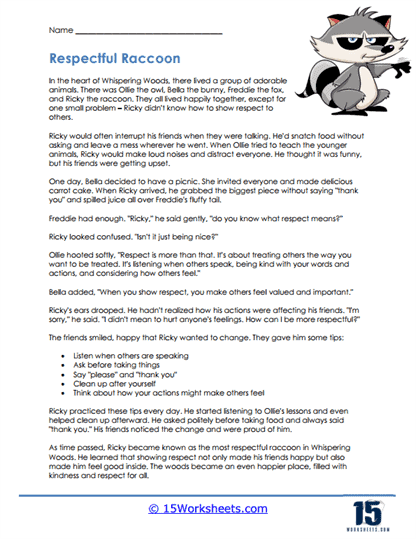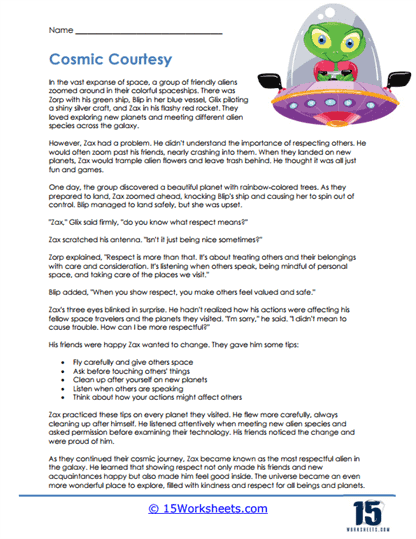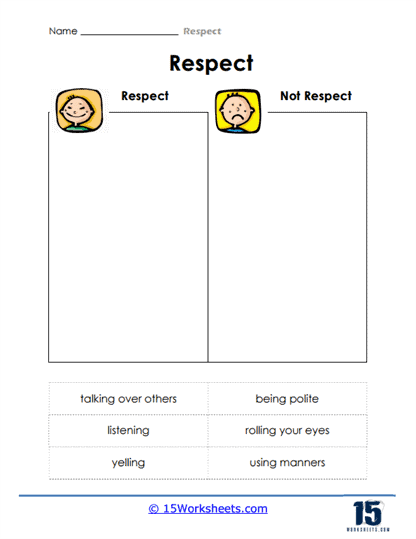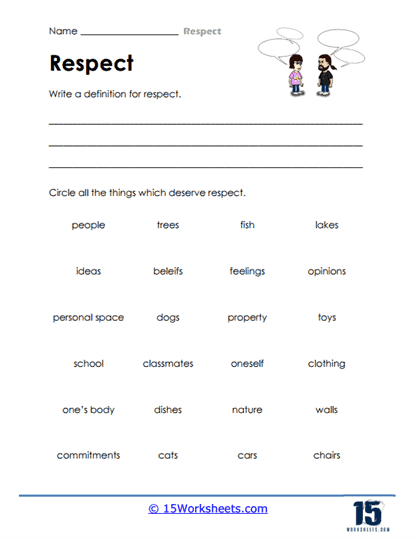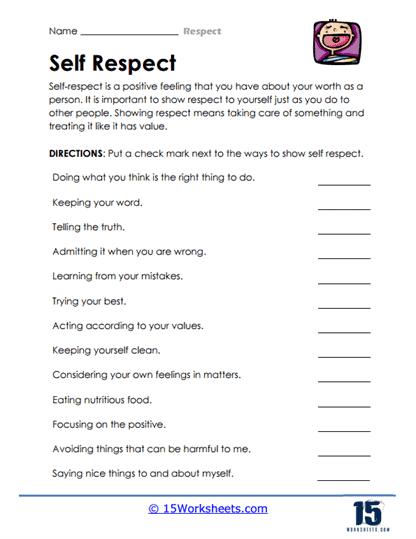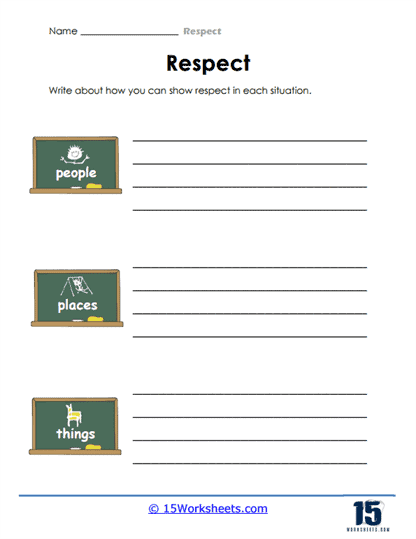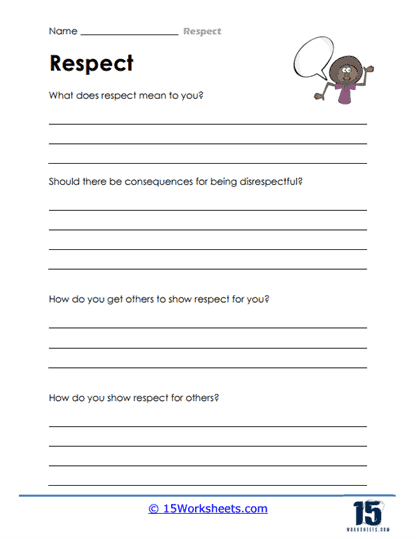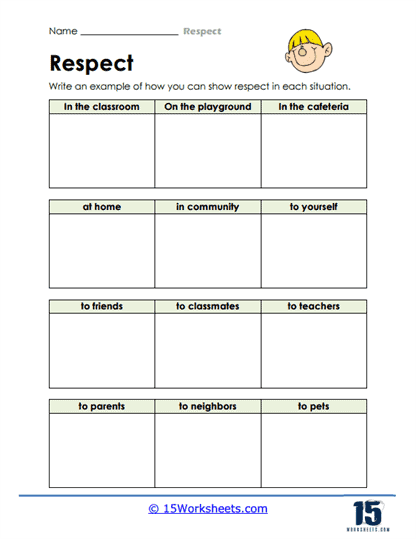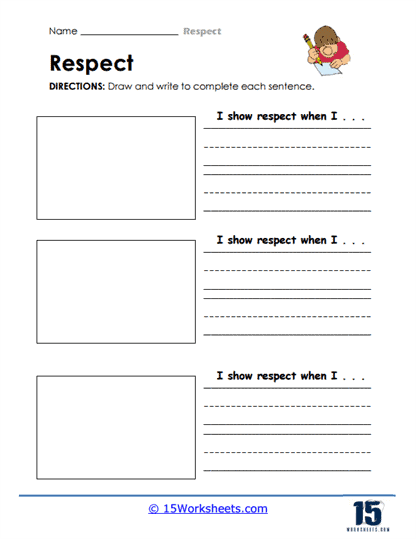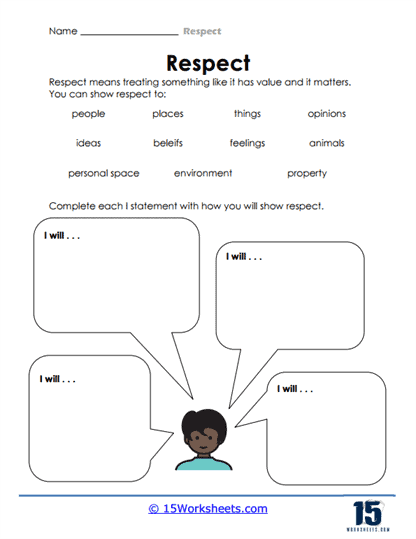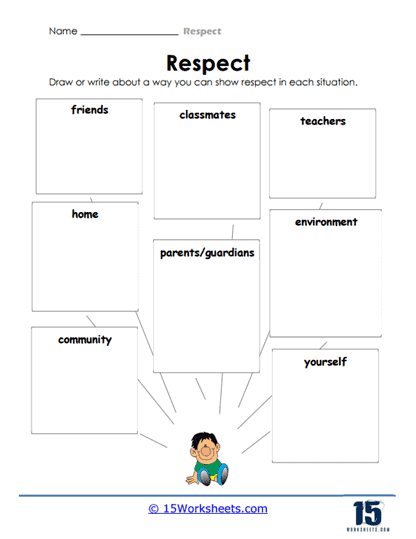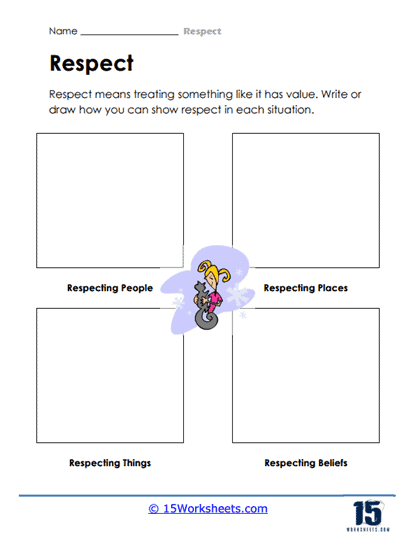Respect Worksheets
About These 15 Worksheets
This worksheet series is an engaging and comprehensive series of activities designed to help students, teachers, and homeschoolers cultivate respect in everyday life. This collection includes a variety of worksheets that focus on different aspects of respect, helping children understand and practice this essential value in diverse contexts. Through these activities, students are encouraged to reflect on what respect means, how it looks in various situations, and why it is important for building healthy, positive relationships both in and out of the classroom.
One example from this collection is a worksheet that prompts students to match respectful actions with corresponding behaviors. This simple yet effective exercise helps students identify what respectful behavior looks like in practical terms, such as using kind words, waiting their turn, and listening when others speak. Another worksheet uses visual scenarios where students write in speech bubbles how someone could show respect in different situations. This activity allows students to apply their understanding of respect to real-life contexts, reinforcing their learning in a creative and engaging way.
The collection also includes worksheets that focus on defining respect and recognizing what deserves respect. For instance, one worksheet asks students to write their own definition of respect and then circle various things that deserve it, such as people, ideas, personal space, and nature. This exercise broadens students’ understanding of respect by encouraging them to consider it in relation to both tangible and intangible aspects of life. Another worksheet explores the concept of self-respect, guiding students to recognize the importance of treating themselves with the same care and consideration they would offer others. Activities like listing ways to show self-respect and understanding its impact on personal well-being help students internalize the value of respecting themselves.
You will also find story-based activities, like the “Respectful Raccoon” and “Cosmic Courtesy” worksheets. These worksheets feature engaging stories about characters who learn the importance of respect through their actions and the consequences that follow. After reading the stories, students answer comprehension questions that reinforce the lesson and encourage them to think critically about how they can apply respect in their own lives. These narrative-based activities not only make learning about respect fun but also help students understand the deeper significance of respectful behavior.
In addition to these examples, the collection features worksheets that prompt students to write examples of how they can show respect in different settings, such as in the classroom, at home, or in the community. This helps students see the broad application of respect and how it can positively impact various areas of their lives. There are also activities where students are asked to draw or write about how they can show respect to people, places, things, and beliefs, further expanding their understanding of this crucial value.
Whether through matching activities, storytelling, writing exercises, or visual scenarios, these worksheets offer diverse and creative ways to help children internalize and practice respect. Available in PDF format, these worksheets are easy to view, download, and print, making them a convenient tool for both classroom and home education. This collection not only fosters a respectful attitude in students but also supports them in building stronger, more positive relationships with others and themselves.
What Is Personal Respect?
Personal respect refers to the recognition and appreciation of one’s own worth and dignity. It involves valuing oneself enough to maintain boundaries, make thoughtful decisions, and treat oneself with care and kindness. When a person respects themselves, they are more likely to engage in behaviors that are healthy and positive, such as pursuing goals, standing up for their beliefs, and maintaining their well-being. Personal respect is foundational to self-esteem, as it reflects how much we value our own existence and the choices we make in life. When we respect ourselves, we set a standard for how we expect to be treated by others, and this, in turn, influences our interactions and relationships.
Exhibiting respect towards others is crucial for creating harmonious and positive social environments. Respecting others means acknowledging their worth, listening to their opinions, and valuing their feelings and experiences. This behavior fosters trust, cooperation, and mutual understanding, which are essential components of any healthy relationship, whether it be with friends, family, colleagues, or even strangers. When we show respect, we contribute to a culture of kindness and consideration, where people feel safe, valued, and appreciated. This not only improves interpersonal dynamics but also strengthens the social fabric by promoting inclusivity and empathy.
Respect is a key ingredient in all types of relationships, from personal to professional. In friendships, respect allows individuals to feel heard and valued, which deepens the bond and trust between them. In professional settings, respect leads to effective collaboration, as it encourages open communication and the free exchange of ideas. When people feel respected, they are more likely to be engaged, motivated, and willing to contribute positively to the relationship or group dynamic. Conversely, a lack of respect can lead to conflicts, misunderstandings, and a breakdown in communication, which can harm relationships and create a toxic environment.
Respect is inherently reciprocal; when we show respect to others, we are more likely to receive respect in return. This reciprocal nature of respect is what sustains positive relationships and social cohesion. When people feel respected, they tend to mirror that behavior back to those who have shown them respect. This creates a cycle of positive interactions, where mutual respect leads to greater understanding, cooperation, and a sense of belonging. Conversely, disrespect often breeds resentment and conflict, disrupting the balance of relationships and community life.

